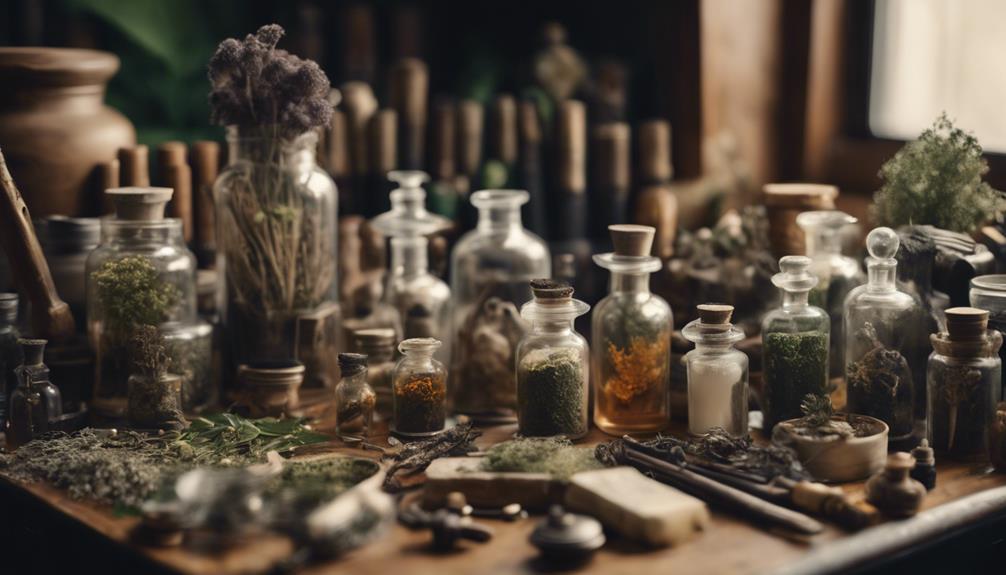Throughout history, women have made significant contributions to herbal medicine, shaping its development and leaving a lasting impact. Notable pioneers like Hildegard of Bingen and Elizabeth Blackwell paved the way for future generations of herbalists. Despite facing obstacles such as accusations of witchcraft and limited access to education, women continued to advance the field. Their legacies of knowledge and innovation have had a profound impact on herbal remedies. From ancient civilizations to modern breakthroughs, the influence of pioneering women in herbal medicine's history is undeniable, and exploring their stories reveals a rich tapestry of achievements and discoveries waiting to be uncovered.
Key Takeaways
• Women like Hildegard of Bingen, a 12th-century Benedictine abbess, made significant contributions to herbal medicine despite facing obstacles.
• Elizabeth Blackwell, the first female doctor in the US, wrote about herbal remedies, paving the way for future generations of female herbalists.
• Throughout history, women faced accusations of witchcraft, limited access to education, and social and economic constraints, hindering their involvement in herbalism.
• Despite these challenges, women played a crucial role in shaping the course of herbal medicine, leaving a lasting impact on the field.
• Women from marginalized communities faced even greater obstacles, yet still managed to make substantial contributions to the development of herbal medicine.
Ancient Roots of Herbalism
As the earliest recorded evidence of herbal medicine dates back to ancient civilizations, the roots of this holistic practice can be traced to the dawn of human history. The convergence of traditional knowledge, cultural beliefs, and observation of natural phenomena laid the foundation for the development of herbalism.
The ancient Sumerians, Egyptians, and Chinese civilizations all employed herbal remedies to treat various ailments. These early practitioners recognized the medicinal properties of plants and developed a sophisticated understanding of their applications. The discovery of ancient texts, such as the Ebers Papyrus and the Huangdi Neijing, provides valuable insights into the historical context of herbal medicine.
These ancient civilizations' contributions to the field of herbalism have had a lasting impact on the evolution of this holistic practice.
Pioneers in Herbal Medicine

Among the pioneers in herbal medicine, a notable few have left an indelible mark on the development of this holistic practice, their groundbreaking contributions paving the way for future generations of herbalists.
These trailblazers have played an essential role in shaping the course of herbal medicine, often in the face of adversity and societal constraints. Women like Hildegard of Bingen and Elizabeth Blackwell have made significant contributions to the field, leaving behind a rich legacy of knowledge and innovation.
Their work has not only advanced the understanding of herbal remedies but has also paved the way for modern practitioners to build upon. As we explore the history of herbal medicine, it is crucial to acknowledge and celebrate the pioneering spirit of these women, whose dedication and perseverance have had a lasting impact on the field.
Ethical Practices in Herbalism
With the increasing global demand for natural remedies, the herbal medicine industry faces unprecedented pressure to embrace sustainable and ethical practices that uphold the long-term viability of medicinal plant species.
The consequences of neglecting these practices are dire, as overharvesting and habitat destruction threaten the very existence of medicinal plants.
To combat this, it is essential to adopt ethical sourcing and cultivation methods that prioritize biodiversity and conservation.
Three critical areas requiring immediate attention are:
- Sustainable harvesting: Ensuring that plant species are harvested in a way that maintains their populations and prevents over-exploitation.
- Conservation efforts: Protecting and preserving natural habitats to maintain the delicate balance of ecosystems.
- Ethical trade practices: Promoting fair trade and accountability throughout the supply chain to prevent exploitation of indigenous communities and the environment.
Challenges Faced by Women

Throughout history, women have faced numerous obstacles in their pursuit of herbalism, from accusations of witchcraft to limited access to education and professional growth, which have hindered their ability to contribute to the field. These challenges have been particularly pronounced for women from marginalized communities, who have faced additional barriers to entry and advancement.
Social and economic constraints have also limited women's opportunities, with many being relegated to secondary roles or forced to practice in secret. Furthermore, women have often been excluded from formal educational institutions, forcing them to rely on apprenticeships or self-study.
Despite these obstacles, women have persevered, making significant contributions to the field of herbal medicine.
Future of Herbal Medicine
As the demand for natural remedies continues to grow, the future of herbal medicine holds promise for innovative breakthroughs, collaborative research, and mainstream recognition. The exploitation of traditional knowledge with modern science and technology is expected to drive progress in the field.
Key areas of focus include:
- Advancements in genomics and biotechnology: Leveraging the full potential of medicinal plants through cutting-edge research and development.
- Collaborative research and knowledge sharing: Fostering global partnerships to advance our understanding of herbal medicine and its applications.
- Mainstream recognition and integration: Increasing acceptance and adoption of herbal medicine in conventional healthcare systems.
As the industry continues to evolve, it is essential to prioritize ethical and sustainable practices, ensuring the long-term viability of herbal medicine for future generations.
Frequently Asked Questions
Can Herbal Medicine Be Used in Conjunction With Modern Western Medicine?
To guarantee safe and effective integration when using herbal medicine in conjunction with modern Western medicine, consulting with a qualified healthcare professional is crucial. This integrative approach can enhance treatment outcomes, improve patient satisfaction, and reduce side effects.
Herbal remedies can be used to alleviate symptoms, support medication, and promote overall well-being. However, seeking guidance from a healthcare professional is vital to prevent potential herbal interactions with prescription medications.
How Do Cultural and Traditional Practices Influence Herbalism Today?
As the adage goes, 'the roots of a tree are not seen, but they are what hold it upright.' Similarly, cultural and traditional practices form the foundation of herbalism today. They influence the selection of medicinal plants, preparation methods, and treatment approaches.
For instance, Ayurvedic and Traditional Chinese Medicine principles continue to guide modern herbal practices, emphasizing holistic well-being and balance. These cultural roots shape the identity of herbalism, fostering a rich diversity of approaches that cater to diverse populations.
Are There Any Recorded Cases of Herbal Remedies Gone Wrong?
Recorded cases of herbal remedies gone wrong are evident throughout history. In ancient Greece, for instance, the philosopher Socrates was executed by drinking a concoction of hemlock, a toxic plant.
Similarly, in the Middle Ages, the use of deadly nightshade led to poisoning and fatalities. More recently, cases of liver damage and interactions with prescription medications have been linked to certain herbal supplements.
These examples highlight the importance of responsible use and regulation of herbal remedies.
Can Anyone Become an Herbalist, or Are Formal Qualifications Necessary?
'As the old adage goes, 'an ounce of knowledge is worth a pound of cure.'
In the domain of herbalism, formal qualifications are not always necessary, but they are highly recommended. While anyone can learn about herbal remedies, a thorough education in botany, pharmacology, and safety protocols is essential to avoid adverse effects.
Self-taught herbalists may possess valuable traditional knowledge, but formal training provides a well-rounded understanding of herbal medicine, ultimately safeguarding both the practitioner and the patient.'
Are There Any Modern, High-Tech Ways to Analyze Herbal Remedies?
Modern analytical techniques have revolutionized the study of herbal remedies. High-performance liquid chromatography (HPLC) and gas chromatography-mass spectrometry (GC-MS) enable the identification and quantification of bioactive compounds.
Additionally, nuclear magnetic resonance (NMR) spectroscopy and Fourier transform infrared (FTIR) spectroscopy provide detailed structural analysis. These advanced methods facilitate the standardization and quality control of herbal products, ensuring their safety and efficacy.
Conclusion
In summary, the pioneering women in herbal medicine's history have left an indelible mark on the field, overcoming obstacles to contribute substantially to its development.
Ironically, as the demand for natural remedies grows, the threat of overharvesting and habitat destruction looms, underscoring the importance of ethical and sustainable practices.
As the field continues to evolve, it is essential to integrate historical insights with modern innovations, ensuring the enduring legacies of these pioneering women pave the way for a sustainable future in herbal medicine.










